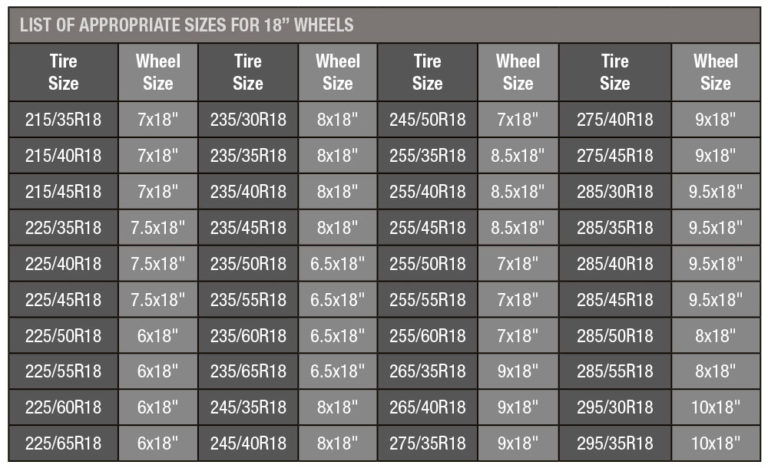Decoding Your Rim: The Ultimate Tire Size Guide

Ever stared at a tire wall, feeling overwhelmed by the sheer number of options? Matching the right tire to your rim can feel like deciphering a secret code. But it's a crucial step for safe and optimal driving. This guide will demystify the process, giving you the confidence to choose the perfect tire fit.
Choosing the correct tire size isn't just about aesthetics; it directly impacts your car's handling, fuel efficiency, and overall safety. An improperly sized tire can lead to anything from a bumpy ride to a dangerous blowout. Understanding the relationship between your rim and tire is essential for maintaining your vehicle's performance and your peace of mind.
The need to understand tire and rim compatibility arose with the advent of the automobile itself. Early tires were simple, but as cars evolved, so did their tires. The standardization of tire sizing allowed for interchangeability and a wider range of options. Knowing how to interpret these standards is key to navigating the modern tire market.
One of the main challenges in figuring out the correct tire size is understanding the cryptic alphanumeric code on the tire's sidewall. This code contains vital information about the tire's dimensions, load capacity, and speed rating. Deciphering this code is the first step in matching a tire to your rim.
This guide will equip you with the knowledge you need to confidently choose the right tire. We'll cover everything from reading tire sidewall markings to understanding the implications of different tire sizes on your vehicle's performance. By the end, you'll be able to navigate the tire aisle with ease and ensure a perfect fit for your rims.
The tire sidewall marking, for instance, "225/45R17 94V" tells a story. 225 is the tire width in millimeters. 45 is the aspect ratio, the height of the sidewall as a percentage of the width. R stands for radial construction. 17 is the rim diameter in inches. 94 is the load index, and V is the speed rating.
Finding the proper tire size is crucial for several reasons. Firstly, it ensures safety by maintaining proper contact with the road, impacting braking and handling. Secondly, it optimizes fuel economy as properly inflated and sized tires minimize rolling resistance. Lastly, it enhances ride comfort, avoiding harsh rides caused by ill-fitting tires.
To determine your rim size, look for a marking on the rim itself, often expressed in inches. Once you know your rim diameter, you can narrow down your tire choices to those compatible with your rims. Consult your vehicle owner’s manual for recommended tire sizes.
Use online tire size calculators. Many reputable tire retailers offer online tools that help you determine compatible tire sizes based on your vehicle's year, make, and model.
Check the sticker on your driver's side doorjamb. This sticker typically provides information about recommended tire pressures and sizes for your vehicle.
Advantages and Disadvantages of Knowing Your Tire Size
| Advantages | Disadvantages |
|---|---|
| Improved safety | Requires some initial research |
| Better fuel economy | |
| Enhanced ride comfort |
Best Practices: 1. Always consult your owner's manual. 2. Use a reputable tire size calculator. 3. Check the tire sidewall information. 4. Don't solely rely on visual comparisons. 5. Consult a tire professional if unsure.
FAQ: 1. What happens if I use the wrong size tire? - It can negatively impact handling, braking, and fuel efficiency. 2. Where can I find my rim size? - On the rim itself or in your owner's manual. 3. Can I use wider tires than recommended? - It depends on your vehicle and wheel wells, consult a professional. 4. What does the speed rating mean? - It indicates the maximum speed a tire can safely sustain. 5. What is the load index? - It indicates the maximum weight a tire can carry. 6. Do I need to change my rims to get different tires? - Not necessarily, you can find tires in different sizes that fit your existing rims. 7. Where can I get my tires changed? - At tire shops, auto repair shops, or some dealerships. 8. Can I mix different tire sizes on my car? - Generally not recommended, as it can affect handling and stability.
Tips and Tricks: When inspecting your tires, look for uneven wear patterns, which can indicate alignment issues or incorrect tire pressure. Rotate your tires regularly to ensure even wear and extend their lifespan.
Understanding how to determine the correct tire size for your rims is an essential aspect of car ownership. From safety and performance to fuel efficiency and ride comfort, the right tires play a crucial role. By following this guide, you’ve equipped yourself with the knowledge to confidently choose the perfect tire fit. Remember to always consult reputable sources, like your owner’s manual and tire professionals, for personalized advice. Investing the time to learn about tire and rim compatibility empowers you to make informed decisions, ultimately contributing to a safer and more enjoyable driving experience. Take control of your vehicle's performance and prioritize your safety by ensuring your tires are the perfect match for your rims.
Exploring the world of reverse harem romance
Modern colonial interior paint colors a timeless elegance
Decoding the nfl clock just how long is a football game












